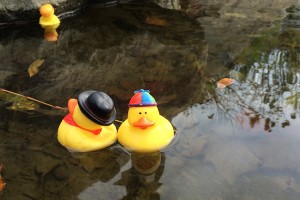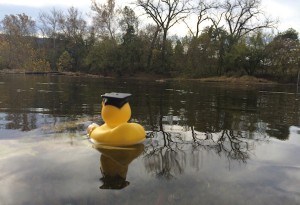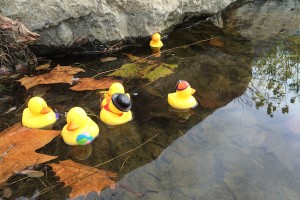Face It: You’re One Odd Duck
 You walk in the chapel Sunday and sit by yourself. Even if you’re near someone, you still feel alone.
You walk in the chapel Sunday and sit by yourself. Even if you’re near someone, you still feel alone.
You look around at others smiling about their weeks and high-speed downloading the delicious details of their interesting lives.
The service begins and you realize your exchange with the usher at the chapel door was your only interaction so far. But honestly, you’re not really sure it counts. After all, he was talking to someone else when you passed by and he didn’t even make eye contact as he extended the canary-colored program into your path.
Can you blame him? That other person’s life sounds much more flavorful.
Face it: You’re one odd duck. And you’re often invisible, swimming in a sea of normal ducks.
 Are you a teen? It’s probably even worse. You walk into school every day and, if you’re lucky, someone will call you by your real name and ask to borrow a pen. But besides that exchange, on most days when you hear your name, it’s preceded by a nickname that flushes your face.
Are you a teen? It’s probably even worse. You walk into school every day and, if you’re lucky, someone will call you by your real name and ask to borrow a pen. But besides that exchange, on most days when you hear your name, it’s preceded by a nickname that flushes your face.
It doesn’t help that nothing you own came from Hollister; your threads came from your brother two summers ago. You’re just different, and no matter how hard you try, you go mostly unnoticed in a high school society that rewards looks, money and athletic ability.
You just wish someone knew that your mother is dying, or that your parents have been fighting round-the-clock and you try not to hear them late at night, but it’s difficult when the shouting is followed by another broken bowl.
 Or, perhaps, there is no shouting because your parents hardly speak. The last time you heard someone say “I love you” was from two teens hugging in the hallway.
Or, perhaps, there is no shouting because your parents hardly speak. The last time you heard someone say “I love you” was from two teens hugging in the hallway.
Sounds familiar?
These ducks are all around us and they come in all ages, colors and sizes. Chances are at some point you’ve been an odd duck, too. Maybe you feel like one today.
Last month while presenting a school assembly at an intermediate school on the East Coast, I took a moment before the students entered the large auditorium and placed a small, scarf-wearing yellow rubber duck on a piano bench on the stage. Before the staff opened the doors, I hopped off and hiked to the side and back rows to see how visible the duck would be from all angles.
You couldn’t miss it.
 About midway through my presentation, while talking about something completely unrelated, I casually picked up the duck and dropped it into a box that held several other props.
About midway through my presentation, while talking about something completely unrelated, I casually picked up the duck and dropped it into a box that held several other props.
Then, at the end of my remarks, I asked how many of the students had observed something unusual on the stage earlier in the program. Out of several hundred students, only a few hands popped up. A remarkable few had indeed noticed and been curious about the odd, lonely duck.
“I’ve been that duck,” I told them. “And how many of you have ever felt invisible, too?”
Courageous hands everywhere slowly rose.
At different times in my life, I’ve been both the odd duck that almost no one sees and the person too preoccupied to notice.
 When I was the about the age of my audience, my father died a week before the start of Christmas break. My mother gave me those cold days off to find smooth water before returning to my routine in January. Just before classes ended, she suggested I visit school and pick up some work to both keep my mind busy and to keep my grades from sinking.
When I was the about the age of my audience, my father died a week before the start of Christmas break. My mother gave me those cold days off to find smooth water before returning to my routine in January. Just before classes ended, she suggested I visit school and pick up some work to both keep my mind busy and to keep my grades from sinking.
I didn’t know how many students were aware my father had died, but I assumed word had circulated and that at least most of the kids in my grade had heard the rumors. I walked in a fog down the hallway, navigating my way to the teacher who’d gathered the assignments.
I’ll never forget it. I wore my father’s heavy wool overcoat and wondered if anyone would say anything to me, how I would respond, or if anyone would see me at all. Rounding a corner on the second floor, a girl I didn’t know emerged from a pack of kids and put her hand on my shoulder: “Are you OK?”
They were probably the first three words she’d ever spoken to me. And though it was more than 20 years ago, I can visualize with Kodachrome clarity exactly where the exchange took place, on what side of the hallway we were on and how it felt for her to notice me. I choked back tears, smiled at her and moved on.
I was the oddest of ducks that day, and she’d seen me. She’d lived the duck doctrine.
Every single day, every single one of us pass by those who feel completely out of place, so different from anyone around them and desperate to simply be recognized. In most cases, the ducks we encounter don’t need trumpet tributes, red carpets or parades.
In a church setting, they don’t want to be embarrassed with questions about where they’ve been, why they’re back or how long they’ve been swimming out at sea all alone.
At school or work, they don’t need to be fawned over or treated as if they are projects-to-be-assembled like some paint-by-number craft or particle board bookcase.
They just need someone to see them and to call them by name. But more importantly, they need to know that God sees them and knows their name, too. In many cases, that might be all they need to feel a little less like a duck, and a lot more like a swan.
It’s the duck doctrine, and take it from a perpetually odd duck, it works.
You can read more of Jason's articles HERE:
You can read more of Jason's articles HERE:

No comments:
Post a Comment